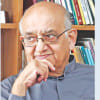FY25 budget won’t ensure energy sustainability: CPD

The budget for the next fiscal year may not be able to end the chronic gas shortage, cut import reliance and guarantee credible supply of electricity as it has fallen short of taking up sufficient measures needed to ensure energy sustainability, the Centre for Policy Dialogue (CPD) said yesterday.
Instead, it encourages anti-sustainability measures by backing coal-based power generation and setting overly ambitious power demand targets, it said.
The observations are the outcome of a CPD study on the power and energy sector. The findings were presented at an event styled "Power and Energy Sector in the National Budget FY2025: Can the Proposed Measures Address the Challenges?" at the BRAC Centre Inn in Dhaka.
The budget was present at a time when Bangladesh is struggling to produce enough gas from local fields to meet domestic demand despite significant hydrocarbon potentials, both onshore and offshore.
In recent years, as a result, it has been forced to turn to international markets to buy expensive liquefied natural gas (LNG). However, when LNG prices surged globally, the government was compelled to cut its purchase in order to save foreign exchanges, dealing a massive blow to factories.
Furthermore, despite sitting on a huge stockpile of coal, it is buying the fuel from external markets to run the coal-fired power plants.
"This budget is not the kind of budget needed for sustainable energy and energy transition," said CPD Research Director Khondaker Golam Moazzem while presenting a keynote paper.
"We think a big change is needed in the budget where energy transition and energy sustainability issues will be given more importance. This is because without proper planning, allocation, implementation and monitoring, energy sustainability and energy transition will not be achieved."
Moazzem described the government's decision of not allocating fresh funds for fossil fuels as positive. "The budget should reiterate the government's commitment to phase out old, dated, and expensive fuel-based plants."
Moazzem highlighted six major challenges confronting the power and energy sector: rising generation capacity; continuous load-shedding; slow progress of transmission and distribution system projects; less attention given towards renewable energy expansion; inability to import energy; and continuous financial loss of public entities.
He, however, said a reduction in budgetary allocation for the gas sector is not rational. "There is no alternative to domestic gas exploration to increase fuel supply and reduce load-shedding."
The integration of renewable energy into the grid has a lot to do with the upgradation of transmission and distribution systems, he said.
The CPD also pointed out the subsidy going to the power sector, which received Tk 40,000 crore for 2024-25, accounting for 37 percent of the subsidy segment. Most of the allocation will be spent on paying capacity charges.
Stating that the subsidy is not a sustainable solution, Moazzem said relying heavily on imported LNG could make Bangladesh more vulnerable to changes in global prices.
A subsidy allocation of Tk 7,000 crore in LNG imports has been proposed in FY25, which is up from Tk 6,000 crore in the outgoing fiscal year.
"Rather than enhancing LNG import, the fund should be allocated for domestic gas exploration," the economist said.
He said some important issues that required distinctive fiscal measures have not been addressed in the budget.
These include fossil fuel phase-out, the retirement of rental and quick rental power plants, ending capacity payments, and incentivising renewable energy.
A special allocation of Tk 100 crore has been proposed by the finance minister to encourage the development and use of renewable energy.
"Though the amount is small, the initiative is appreciated since it will accelerate the breaking of carbon lock-in in the country," Moazzem said.
Prof M Shamsul Alam, energy adviser of the Consumers Association of Bangladesh, alleged that the Bangladesh Energy Regulatory Commission has failed to set fair energy prices.
He alleged that everybody knows about the corruption in the Bangladesh Petroleum Corporation, but no effective steps were taken to stop it.
Mohammad Tamim, a professor of the chemical and materials engineering department of the Bangladesh University of Engineering and Technology, stressed the need for a long-term energy policy and strong regulatory authority.
"The existing energy policy was formulated in 1996 but no amendment has been made yet. A good policy ensures a strong regularity authority."
AK Azad, a lawmaker and an industrialist, said it is becoming difficult to run factories due to a spike in gas prices on the one hand and continuous load-shedding on the other hand.
Mohammad Hussain, director-general of the power cell of the Power Division, said if the country had adequate primary energy, the issues of over-capacity, capacity payments, and the financial losses incurred by state-run entities might not have come into discussion.
He also recognised that it would be better if the allocation in the energy sector goes up.
Mohammad Alauddin, rector of the Bangladesh Power Management Institute, welcomed the first-ever separate allocation for the development of renewable energy.
He called for lowering taxes and duties to encourage the private sector to produce more solar power.

 For all latest news, follow The Daily Star's Google News channel.
For all latest news, follow The Daily Star's Google News channel. 









Comments